Mindfulness practices effectively reduce stress and enhance wellbeing through focused awareness and relaxation techniques. Techniques such as meditation, deep breathing, and body scanning promote emotional regulation and resilience. Cultural adaptation of mindfulness enhances its relevance, while overcoming challenges like distractions can improve practice effectiveness. Advanced techniques and resources further support individuals in integrating mindfulness into their daily lives for better mental health.
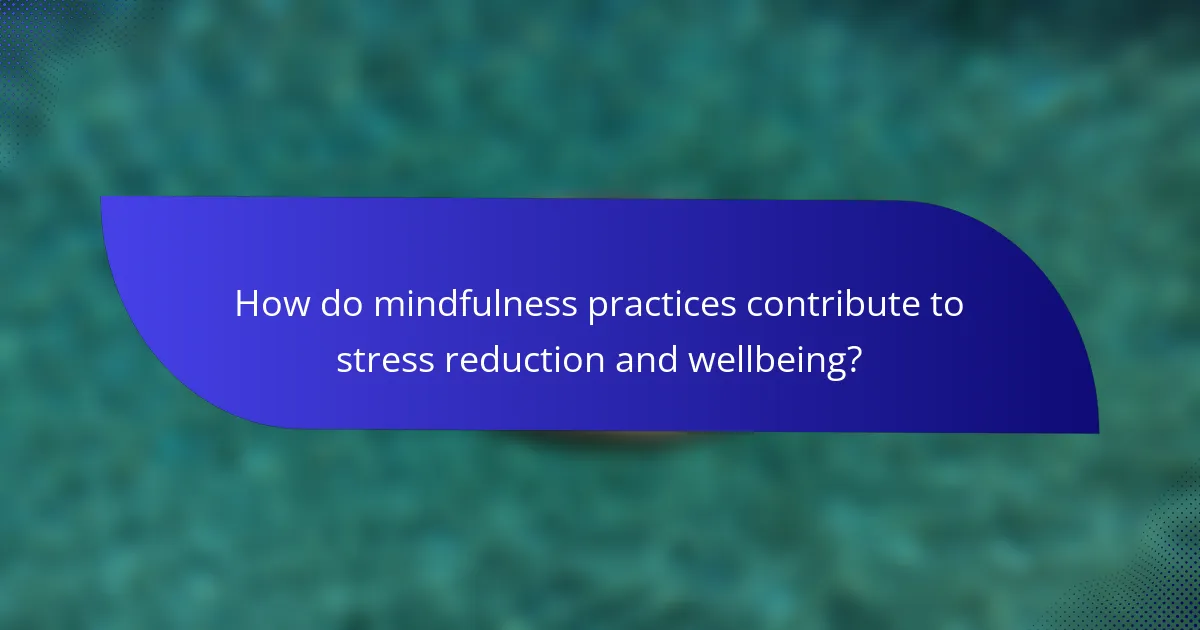
How do mindfulness practices contribute to stress reduction and wellbeing?
Mindfulness practices significantly reduce stress and enhance wellbeing through focused awareness and relaxation techniques. Regular engagement in mindfulness can lower cortisol levels, improve emotional regulation, and foster a sense of calm. Research shows that mindfulness meditation leads to a 30% reduction in stress levels and enhances overall mental health. Techniques such as deep breathing, body scans, and mindful walking promote relaxation and help individuals manage stress effectively. By cultivating present-moment awareness, individuals can develop resilience against stressors, leading to improved quality of life.
What are the physiological effects of mindfulness on stress response?
Mindfulness practices significantly reduce stress response by promoting relaxation and emotional regulation. They activate the parasympathetic nervous system, lowering cortisol levels and heart rate. Research shows that regular mindfulness meditation can decrease anxiety and improve overall well-being. Furthermore, mindfulness enhances awareness, helping individuals respond to stressors more effectively rather than react impulsively.
Which psychological benefits are associated with mindfulness practices?
Mindfulness practices offer significant psychological benefits, including reduced stress, enhanced emotional regulation, and improved focus. These practices cultivate self-awareness and promote a sense of calm. Research indicates that mindfulness can decrease anxiety levels and foster resilience against daily stressors. Additionally, regular engagement in mindfulness can lead to increased life satisfaction and overall well-being.
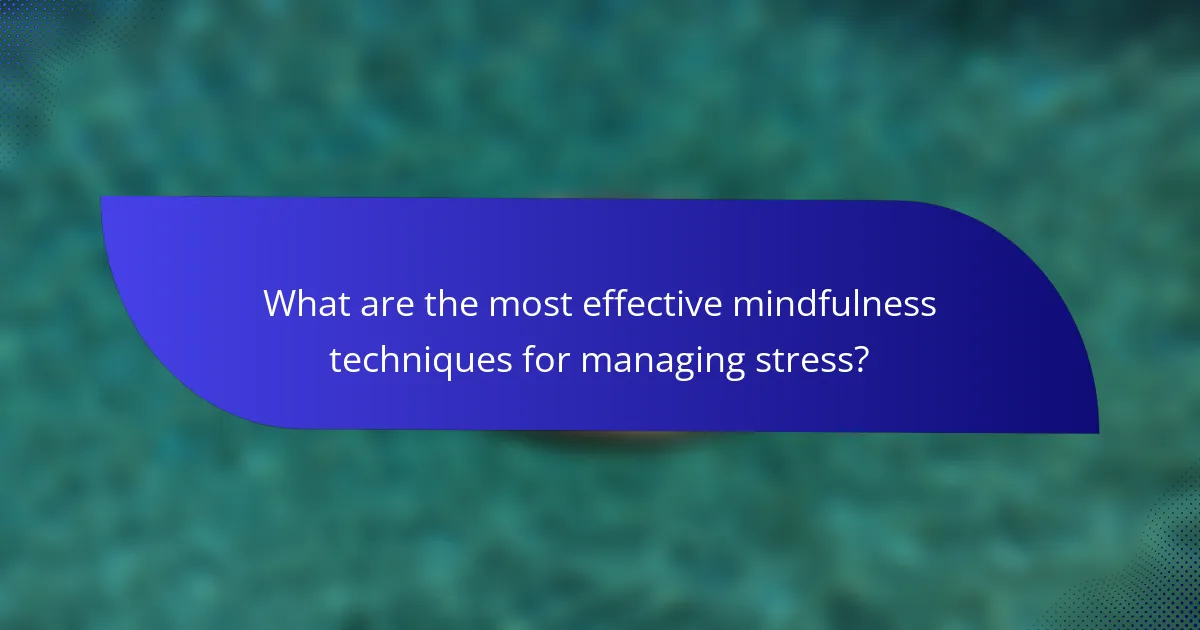
What are the most effective mindfulness techniques for managing stress?
Mindfulness techniques for managing stress include meditation, deep breathing, and body scanning. These practices enhance awareness and promote relaxation, effectively reducing stress levels.
Meditation involves focusing the mind and eliminating distractions. Research shows that just 10 minutes daily can significantly lower anxiety. Deep breathing techniques, such as diaphragmatic breathing, help activate the body’s relaxation response, reducing heart rate and cortisol levels.
Body scanning encourages individuals to focus on different body parts, promoting physical awareness and releasing tension. This practice can be particularly effective in identifying stress areas and fostering a sense of calm.
Incorporating these mindfulness techniques into daily routines can lead to improved emotional well-being and resilience against stress.
How does meditation differ from other mindfulness practices?
Meditation primarily focuses on deep concentration and awareness, while other mindfulness practices often emphasize present-moment awareness in daily activities. Meditation typically involves structured techniques, such as breath control or guided imagery, aimed at achieving mental clarity. In contrast, practices like mindful walking or eating integrate mindfulness into routine actions, promoting a holistic approach to stress reduction. Meditation can lead to deeper states of relaxation and insight, making it a unique attribute among mindfulness practices.
Which mindfulness exercises can be easily integrated into daily routines?
Mindfulness exercises such as deep breathing, body scanning, and mindful walking can be easily integrated into daily routines. These practices enhance stress reduction and overall wellbeing.
Deep breathing involves taking slow, deep breaths to promote relaxation. Body scanning entails focusing attention on different body parts to release tension. Mindful walking encourages awareness of each step and the surrounding environment, fostering presence.
Incorporating these exercises for just a few minutes daily can lead to significant improvements in mental clarity and emotional health. Regular practice cultivates mindfulness, making it easier to manage stress in everyday life.
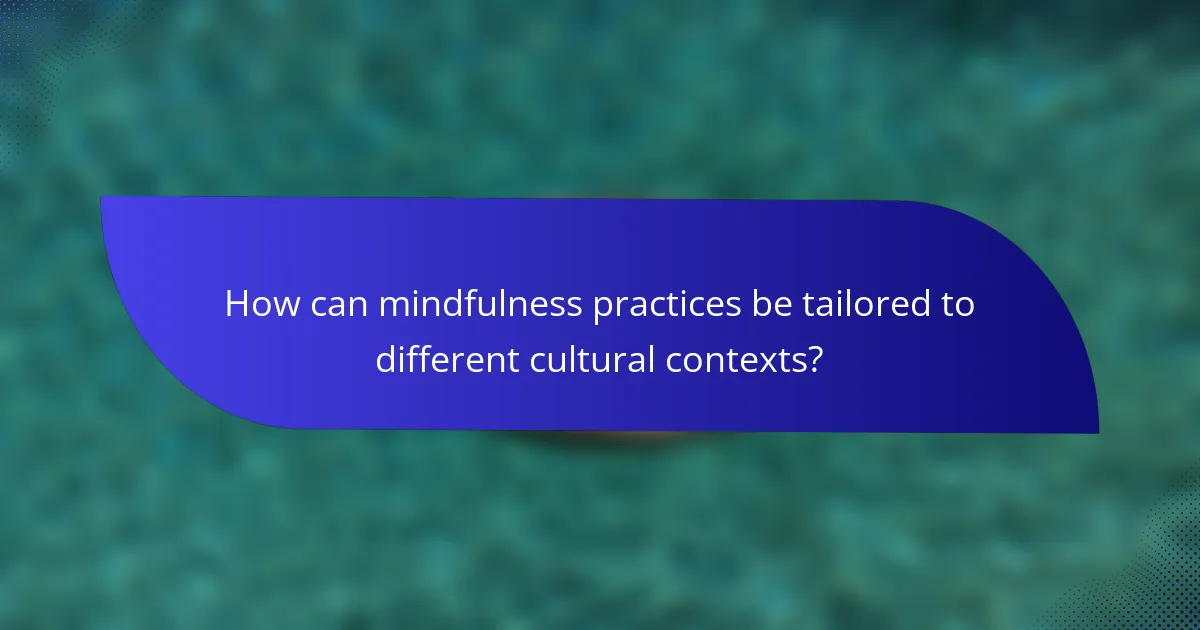
How can mindfulness practices be tailored to different cultural contexts?
Mindfulness practices can be effectively tailored to different cultural contexts by incorporating local beliefs and traditions. Adapting techniques such as meditation and breathing exercises to reflect cultural values enhances acceptance and participation. For example, integrating community rituals can strengthen the practice’s relevance. Additionally, using culturally specific language and symbols can create a deeper connection. Understanding the unique attributes of each culture ensures mindfulness practices resonate with diverse populations, promoting stress reduction and overall wellbeing.
Which mindfulness approaches are popular in North America?
Popular mindfulness approaches in North America include mindfulness meditation, yoga, and mindful breathing techniques. These practices enhance stress reduction and overall wellbeing.
Mindfulness meditation focuses on present-moment awareness, fostering emotional regulation. Yoga combines physical postures with breath control, promoting relaxation and flexibility. Mindful breathing techniques emphasize deep, intentional breathing to reduce anxiety and improve focus.
Research indicates that these approaches can significantly lower stress levels, improve mental health, and enhance life satisfaction. For instance, a study found that regular mindfulness practice can reduce symptoms of anxiety by up to 60%.
Incorporating these mindfulness practices into daily routines can lead to lasting positive changes in mental and emotional health, making them increasingly popular across diverse populations in North America.
How do mindfulness practices vary in the UK and Canada?
Mindfulness practices for stress reduction and wellbeing show notable differences between the UK and Canada. In the UK, mindfulness is often integrated into healthcare settings, with programs like Mindfulness-Based Cognitive Therapy (MBCT) widely utilized. In contrast, Canada emphasizes diverse cultural approaches, incorporating Indigenous practices alongside traditional mindfulness techniques.
UK mindfulness frequently focuses on structured programs and clinical applications, while Canadian practices may include community-based initiatives and outdoor mindfulness activities. Both countries recognize the benefits of mindfulness for mental health, yet their methods reflect unique cultural values and healthcare systems.
As a result, individuals in the UK may encounter more formalized training, whereas Canadians might experience a broader range of practices that emphasize connection to nature and community. This variation highlights the adaptability of mindfulness to different cultural contexts.
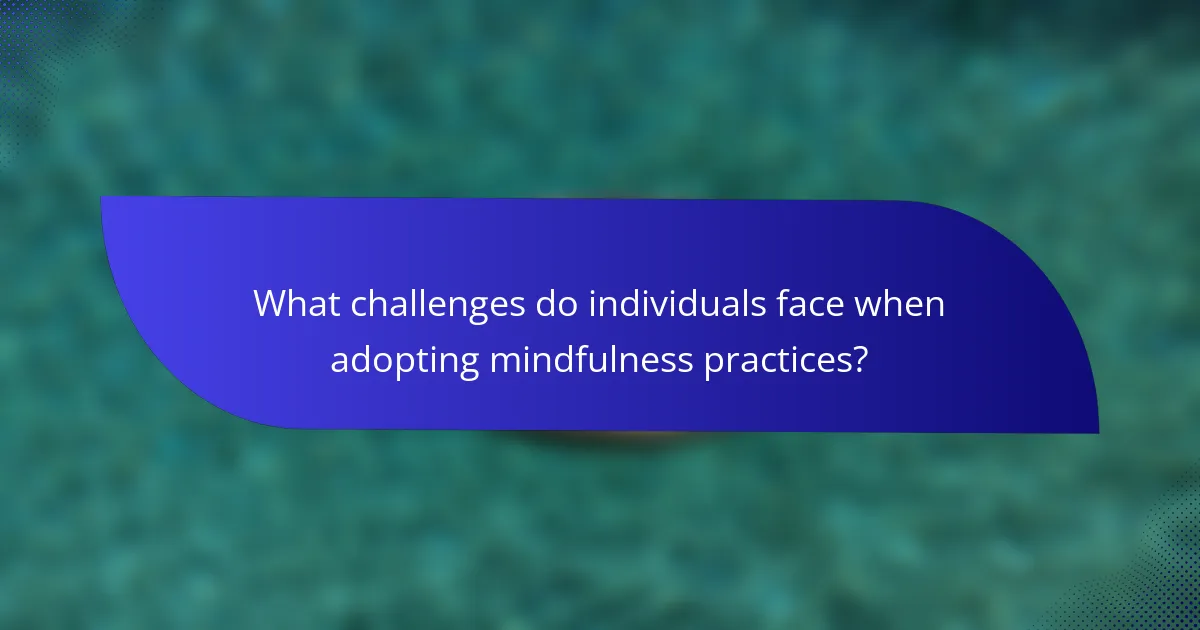
What challenges do individuals face when adopting mindfulness practices?
Individuals face several challenges when adopting mindfulness practices, including difficulty in maintaining focus, resistance to change, and misconceptions about mindfulness. These hurdles can hinder the effectiveness of mindfulness for stress reduction and overall wellbeing.
Many people struggle with distractions that prevent them from fully engaging in mindfulness exercises. Initial resistance often arises from the discomfort of slowing down and confronting one’s thoughts. Additionally, some may hold misconceptions that mindfulness requires a specific environment or extensive training, creating barriers to practice.
Regular practice can help overcome these challenges. Establishing a routine fosters familiarity and comfort, making it easier to integrate mindfulness into daily life. Seeking guidance from experienced practitioners can also demystify the process and enhance understanding.
Ultimately, recognizing and addressing these challenges is crucial for individuals seeking to benefit from mindfulness practices. With persistence, many can develop a fulfilling mindfulness routine that supports their stress reduction and wellbeing goals.
How can beginners overcome common obstacles in mindfulness practice?
Beginners can overcome common obstacles in mindfulness practice by establishing a routine, focusing on breath, and being patient with themselves. Consistency in practice helps develop familiarity, while breath awareness anchors attention. Additionally, accepting that distractions are natural fosters resilience. Setting realistic goals enhances motivation and reduces frustration.
What role does consistency play in the effectiveness of mindfulness?
Consistency is crucial for the effectiveness of mindfulness, as it enhances mental clarity and emotional stability. Regular practice fosters deeper awareness and reduces stress over time. Studies show that individuals who engage in mindfulness consistently report greater improvements in wellbeing metrics. Furthermore, maintaining a routine helps in establishing a habit, making mindfulness a natural response to stressors.
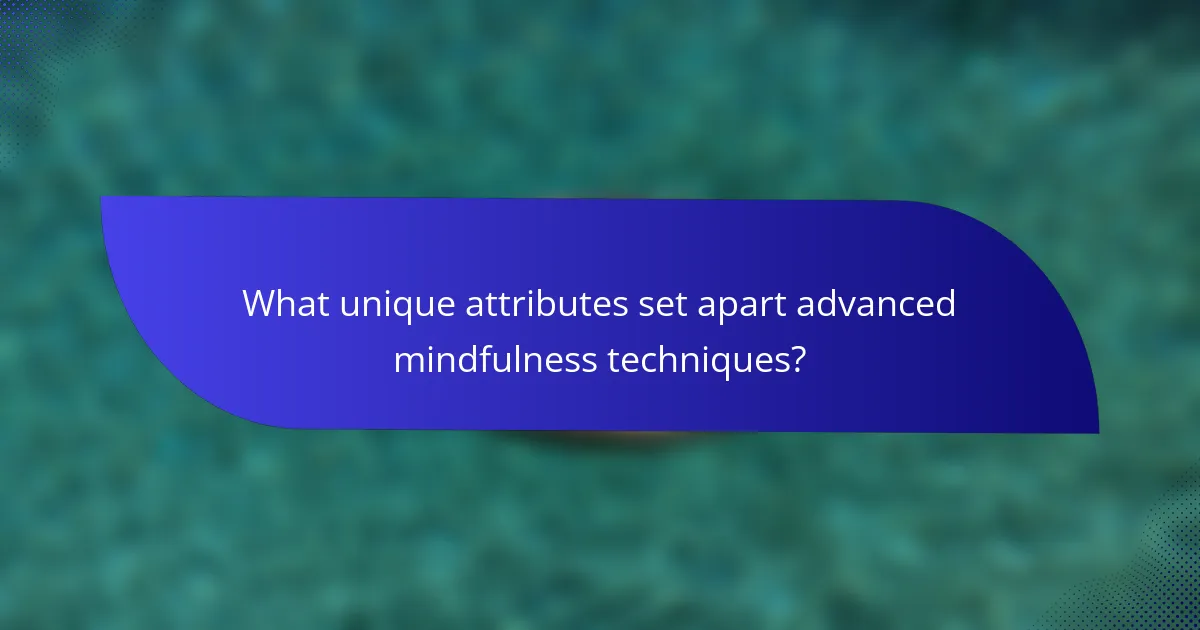
What unique attributes set apart advanced mindfulness techniques?
Advanced mindfulness techniques are distinguished by their emphasis on integration, personalization, and neuroplasticity. These practices adapt to individual needs, enhancing emotional regulation and cognitive flexibility. They often incorporate elements such as body awareness, breath control, and focused attention, which deepen the mindfulness experience. Additionally, advanced techniques may utilize technology, like apps and biofeedback, to track progress and refine practices, making them unique in their approach to mental wellbeing.
How do specialized mindfulness programs address specific stress-related issues?
Specialized mindfulness programs effectively target specific stress-related issues by providing tailored techniques and practices. These programs often focus on unique attributes such as breath awareness, body scanning, or guided imagery to address individual stressors. For instance, programs designed for workplace stress may incorporate short, focused sessions that fit into a busy schedule, while those for anxiety may emphasize calming techniques. The adaptability of mindfulness practices enhances their relevance, ensuring participants can apply them in real-life situations. As a result, these programs promote overall wellbeing by equipping individuals with practical tools to manage stress effectively.
Which rare mindfulness practices have been shown to yield significant results?
Rare mindfulness practices that yield significant results include forest bathing, sound bathing, breathwork, and mindful walking. These practices enhance emotional resilience and promote mental clarity.
Forest bathing, or Shinrin-yoku, immerses individuals in nature, leading to reduced stress and improved mood. Sound bathing utilizes sound frequencies to facilitate deep relaxation and mindfulness. Breathwork focuses on controlled breathing techniques, fostering emotional release and heightened awareness. Mindful walking combines physical movement with present-moment awareness, enhancing overall wellbeing.
Incorporating these rare practices can lead to profound shifts in stress management and mental health, making them valuable additions to traditional mindfulness routines.
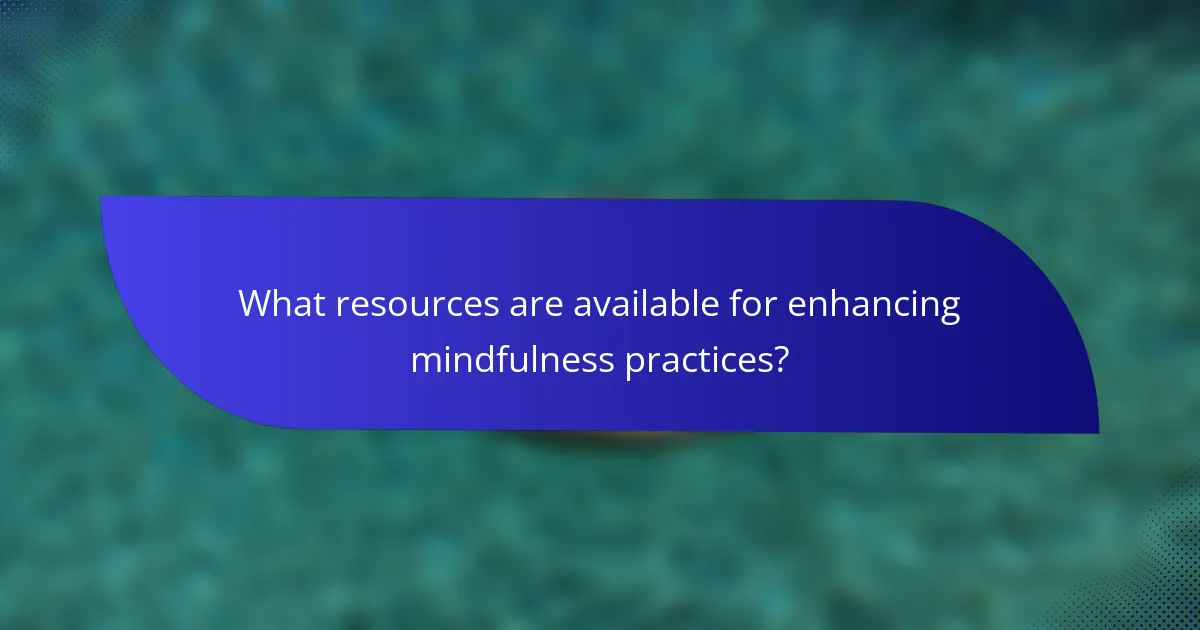
What resources are available for enhancing mindfulness practices?
Numerous resources enhance mindfulness practices for stress reduction and wellbeing. These include guided meditation apps, online courses, mindfulness books, local workshops, and community support groups.
Guided meditation apps like Headspace and Calm offer structured sessions that cater to various experience levels. Online courses from platforms such as Coursera and Udemy provide in-depth training on mindfulness techniques.
Books by authors like Jon Kabat-Zinn and Tara Brach delve into mindfulness concepts and practices. Local workshops often provide hands-on experiences, while community support groups foster shared learning and accountability.
These resources collectively support individuals in integrating mindfulness into their daily lives, promoting overall mental health and resilience.
Which apps and online platforms offer guided mindfulness sessions?
Several apps and online platforms offer guided mindfulness sessions. Popular options include Headspace, Calm, Insight Timer, and Smiling Mind. Each platform provides various sessions tailored to different needs, such as stress reduction and overall wellbeing. For example, Headspace focuses on bite-sized sessions, while Insight Timer features a vast library of free content from various teachers.
What are the benefits of joining mindfulness communities or workshops?
Joining mindfulness communities or workshops offers numerous benefits for stress reduction and overall wellbeing. Participants often experience enhanced emotional resilience, improved focus, and a sense of belonging.
Engagement in these communities fosters accountability and motivation, making it easier to maintain mindfulness practices. Research indicates that group participation can amplify the positive effects of mindfulness, leading to reduced anxiety levels and improved mental clarity.
Additionally, workshops provide structured learning environments where individuals can explore various mindfulness techniques, such as meditation and breathing exercises. These experiences often lead to a deeper understanding of mindfulness principles and their application in daily life.
Overall, mindfulness communities and workshops serve as valuable resources for those seeking to enhance their mental health and cultivate a more balanced lifestyle.
What expert tips can enhance the effectiveness of mindfulness practices?
To enhance the effectiveness of mindfulness practices, focus on consistency, environment, and techniques. Regular practice, even for a few minutes daily, builds habit and deepens mindfulness. Create a calming space free from distractions to promote focus. Incorporate various techniques, such as guided meditation or mindful breathing, to keep the practice engaging.